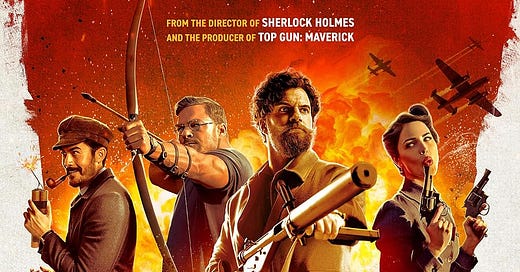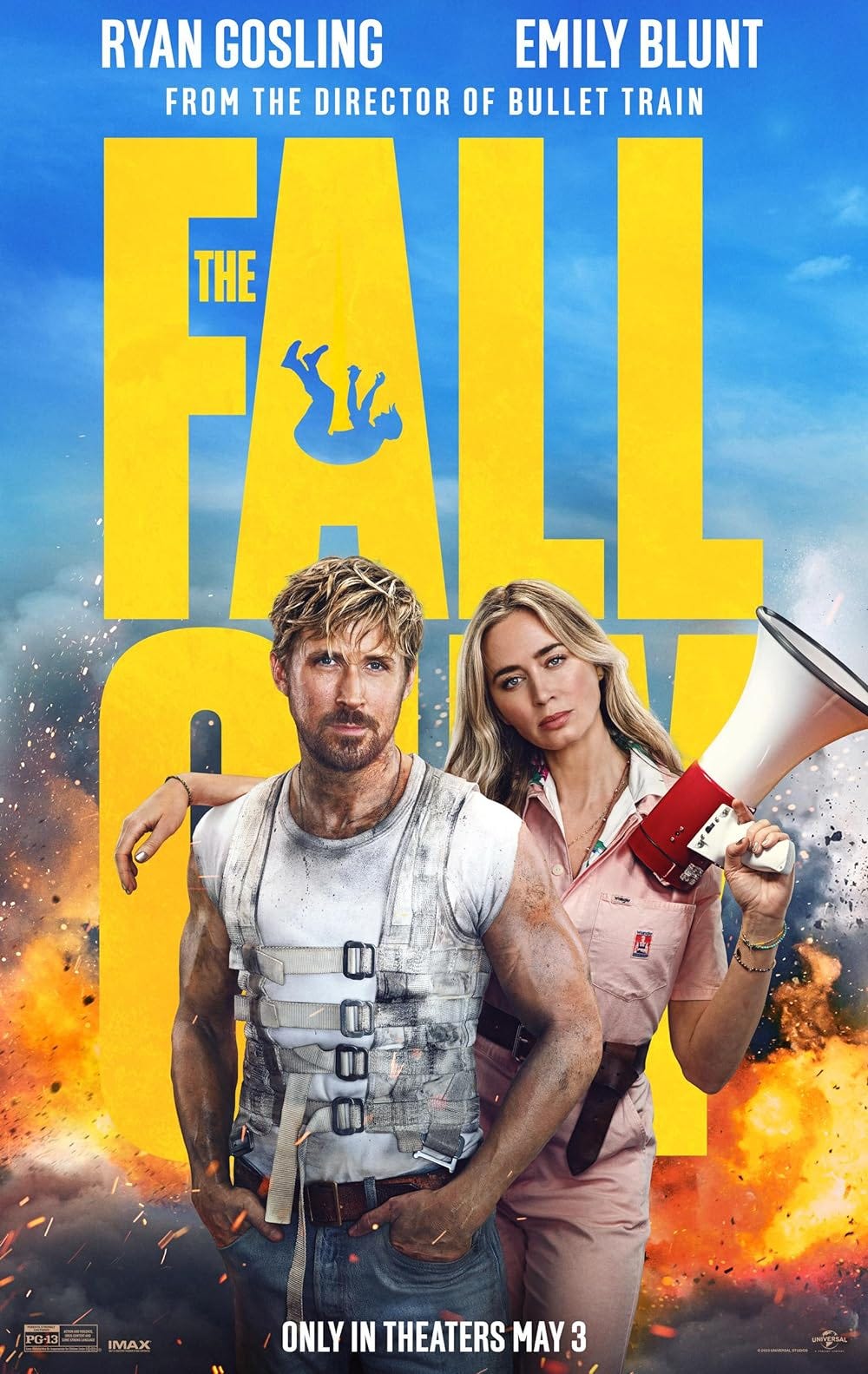Film Review: "The Ministry of Ungentlemanly Warfare" and "The Fall Guy
A pair of action films remind us that there's still a lot of fun left in one of Hollywood's formerly favorite genres.
Hello, dear reader! Do you like what you read here at Omnivorous? Do you like reading fun but insightful takes on all things pop culture? Do you like supporting indie writers? If so, then please consider becoming a subscriber and get the newsletter delivered straight to your inbox. There are a number of paid options, but you can also sign up for free! Every little bit helps. Thanks for reading and now, on with the show!
Warning: Some spoilers for the films follow.
As a general rule, my film tastes tend to run to just about what you’d expect from a 40-year-old millennial gay man, which is to say musicals, melodramas, and rom-coms (with some fantasy and sci-fi thrown into the mix). However, I’ll admit that I also have a soft spot for some of the more traditionally “masculine” genres such as film noir and the action film, and so I decided this weekend to see two recent releases in the latter genre, The Ministry of Ungentlemanly Warfare and The Fall Guy.
Directed by Guy Ritchie, The Ministry of Ungentlemanly Warfare is based at least in part on a true story about a group of soldiers, led by Henry Cavill’s Gus March-Phillipps, as they embark on a top-secret mission to thwart the Germans’ supply lines for their U-boats. They are aided in their efforts by Babs Olusanmokun’s Mr. Heron and Eiza González’s Marjorie Stewart, the latter of whom is something of a femme fatale whose job it is to seduce the local SS commander, Til Schweiger’s Hinrich Luhr. Despite a few hang-ups and changes of direction, the mission largely succeeds, leading to the group’s commendation by none other than Churchill himself (played with scenery-chewing panache by Rory Kinnear).
As one would naturally expect of a film by Guy Ritchie, Ministry is a kinetic fest of masculinity, explosions, and sinister Nazis. As other reviewers have noted, it plays fast-and-loose with the facts, but that doesn’t lessen its pleasures. After all, one doesn’t go into a Guy Ritche film expecting anything even remotely resembling historical accuracy or even a historical consciousness at all. If, on the other hand, you’re willing to just let go of the practical and rational part of your mind and lean into the machismo of it all, there’s really quite a lot to enjoy.
The cast is universally excellent, even if none of the characters are really given much depth, backstory, or development. Henry Cavill, who is a star in search of a franchise, is hunky and charismatic as always, particularly now that he’s sprouting quite a bushy beard and is tasked with playing a key role in the destruction of the Nazis. The rest of the cast pulls its weight, and I was particularly drawn to Alan Ritchson’s muscle-bound Danish god Anders Lassen (who is quite a force be reckoned with given his skills with a bow and arrow) and Cary Elwes’ Brigadier Gubbins (also known as 'M'), who brings some old-fashioned British decorum to the mix.
For me, though, the most compelling–and, frankly, terrifying–performance is the one given by Til Schweiger as Heinrich Luhr. Not to be too simplistic, but in some ways the man simply looks like a Nazi, from his close-cropped hair to his thin lips to his ever-present aura of brooding menace. One immediately gets the sense that this someone not to be trifled with, someone with an almost unnatural ability to sniff out traitors and Jews. His cat-and-mouse game with Marjorie is, I think, far more interesting (and suspenseful) than the rest of the film, particularly when he deduces that she is Jewish from her inadvertent use of Yiddish during her musical act. You know that violence lurks just beneath his seemingly dashing and debonair surface, and you’re on the edge of your seat waiting to see just how this is going to manifest once Marjorie begins her efforts to seduce him.
If I have one complaint about this film, it’s that the actual heist ends up going off with nary a hitch, and even Marjorie escapes from her imprisonment (and shoots Luhr for good measure) without any real sense that she is going to be killed or tortured. The most we get is a brief allusion to the fact that he’s going to put her in shackles and, presumably, torture her as he has already been shown to do to others who cross him. While I’m certainly glad that we didn’t have to see yet another gratuitous moment in which a beautiful woman is tortured by a sinister baddie, I would have liked to have seen at least a little bit more danger. Even so, there’s something quite satisfying about the fact that she doesn’t really need anyone to save her, since she ends up shooting him in the head with a pistol she has hidden in her garter (though why a man like Luhr, who has already shown himself to be so meticulous, would overlook such an obvious hiding place for a gun is beyond me).
Overall, though, The Ministry of Ungentlemanly Warfare is a very fun and enjoyable combination of war and action films. It hits all of the right notes that you would expect from a director like Ritchie, without asking too much of us as viewers. Sometimes, it really is enough to watch Henry Cavill looking hunky and shooting Nazis.
The Fall Guy is, I think, the stronger of the two films. It’s more assured in what it wants to do and, to be quite honest, it uses its action and its humor much more effectively to hook the viewer and keep them invested during its (slightly-too-long) 2-hour runtime. Director Leitch has, like Ritchie, shown a remarkable affinity and acuity with the action film, and he brings those considerable skills to bear in this venture, which somehow manages to be exhilarating, sexy, romantic, and hilarious all at the same time.
Let’s begin with the obvious: Ryan Gosling. As I’ve written here before, the man is an enduring reminder of the power of the male movie star. I don’t know how to say it any more clearly than that he simply radiates charisma as if he is his own sun and everyone else are mere planets revolving around him. He plays the aptly-named Colt Seavers, a stuntman for the spectacularly successful movie star Tom Ryder (played by Aaron Taylor-Johnson). After an injury on-set nearly takes his life, he takes a long break, leading to an estrangement with camera operator-turned-director Jody Moreno (Emily Blunt), but he’s drawn back to the set thanks to the machinations of producer Gail Meyer (Hannah Waddingham). However, things go very awry after he discovers a body on ice in a bathtub, and he then has to race against time to clear his name.
From the moment he appears, Gosling puts under his spell. His Colt is somehow undeniably masculine without being toxic, a guy who isn’t afraid of being steered by a woman in the director’s chair and who isn’t above crying to a Taylor Swift song. Gosling’s greatest asset as an actor is his ability to make us like and love his characters. It certainly helps that Colt, like many of Gosling’s other heroes, isn’t a jerk, even if he sometimes makes mistakes when it comes to handling his feelings.
Of course, Gosling is only one-half of the acting duo in this film, and he is evenly matched by Emily Blunt, who is not only as beautiful as always but is also a woman determined to craft her own art even in an industry that systematically denies women the right to do so. Though she is a supporting character in the second act, she comes roaring back in the third and ends up playing a key (and very action-driven) role in the climax.
The electric chemistry between Gosling and Blunt is juxtaposed to the much more toxic relationship between Hannah Waddingham’s ruthless producer Gail Meyer and her dim-witted tool, Ryder. Waddingham is, I think, always at her best when she gets to really lean into the cut-throat nature of her characters, and Gail is as ruthless as they come, more than happy to sacrifice Colt on the altar of her own ambition. Waddingham sinks her teeth into the scenery and her co-stars, and we love every moment of it. And Taylor-Johnson, while underused–much like Winston Duke and Stephanie Hsu, who also appear–is as charming as always, though this time with a dangerous and more than a little deranged edge.
What I love about a film like The Fall Guy is that it never takes itself too seriously. There are split-screens and drug-induced unicorns, ridiculous chases and plot twists and villains who are as inept and arrogant as they are ruthless. As Brian Tellerico remarks, this is above all a movie that wants to entertain you and to lose yourself in the fun. In this regard, I think it succeeds, and while some of the plot twists–particularly the big one–don’t have quite as much payoff as they might (and while they strain the credulity of even the most naive viewer), I still found myself laughing and having such a damn good time that I didn’t really care.
In addition to being remarkably self-reflexive, it is also a reminder of just how much labor goes into the production of a big Hollywood film. Or, at least, it used to, before studios began investing far more in CGI and AI than they did in human beings. Just as there is something a little nostalgic about its plot–in the sense that it draws our gaze back to the action films of the 1980s, the setting of the series which grants the movie its title–there is also something melancholic about about its callbacks to an earlier period of Hollywood when, to refer to Tellerico again, “a performer could hold a viewer over any narrative speedbump.” This period of Hollywood might be rapidly fading in the rearview mirror, but The Fall Guy makes us want to believe it might be otherwise.
Given the rather lackluster performance both films have endured so far, I’m sure there will be many prognosticators who use them to argue that the industry will turn away from original productions toward established IP. While I’m sure there’s some truth to that, sometimes you just have to let go and let yourself enjoy what the movies themselves have to offer without getting too tangled up in what each one means for the future of Hollywood. Thankfully The Ministry of Ungentlemanly Warfare and The Fall Guy are both a great time, whether or not they make a big splash at the box office.





